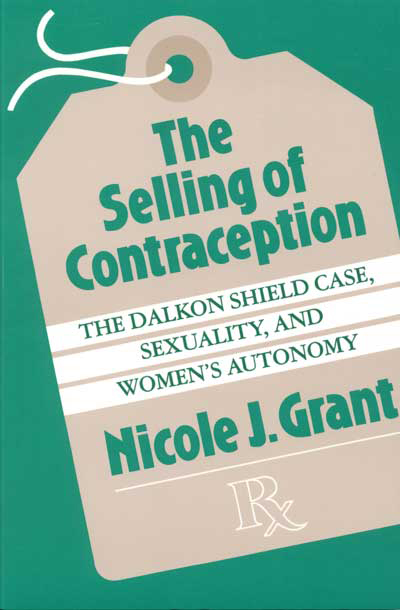The Selling of ContraceptionThe Dalkon Shield Case, Sexuality, and Women’s AutonomyNicole J. GrantWomen, Gender, and Health |
 9/15/1992 223 pp. 6x9  $19.95 paper 978-0-8142-0615-7 Add paper to shopping cart Shopping Cart Instructions Review/Change Shopping Cart & Check-out | |||
|
|
“Nicole Grant does a good job of explaining how, during the second half of the nineteenth century and into the twentieth, the state and medical experts usurped the management of female fertility, and then transformed ‘birth control’ into a lucrative business and a remunerative political proposition. She reviews the sordid details of the development and marketing of the Dalkon Shield and goes on to provide a new dimension to the work that has been done on this issue. . . . Grant’s portrayal of the discussions of the IUD within and beyond the medical community is a tour de force.” —Women’s Review of Books “Impressively researched: a worthy addition to the study of women’s need for increased control of their own lives” —Kirkus Reviews “Grant makes a strong case for the right of women at all class levels to be able to choose freely, and on an informed basis, their reproductive options. She argues that the lack of scientific data on the Dalkon Shield, at first, and then corporate greed in withholding all negative reports and fighting them when they finally began to appear subverted that freedom. The Selling of Contraception contains a fine blend of material from the legal perspective and some excellent interview material with women users, injured and uninjured by this device” —Simon Dinitz, The Ohio State University In this brutal indictment of the birth control industry, Nicole J. Grant documents the history of the Dalkon Shield case and places the controversy within a larger historical and social context, examining the ways in which social conditions affect women’s choices about contraception. Drawing upon an analysis of thirty years' worth of articles in medical journals and popular magazines, family planning literature, medical texts, government documents, and transcripts from interviews with women discussing procreative choices, Grant examines the IUD’s place in the history of contraception and the politics of bringing the Dalkon Shield to the market, including the commercial bias of the device’s inventor and chief medical consultant. She discusses the dissemination of false and misleading advertising about the device, the manufacturer’s disregard of evidence suggesting that it was unsafe, and the stake of various family planning agencies in promoting its use. She goes on to examine the social conditions under which women chose to use the Dalkon Shield and considers the fact that many women, wishing to exercise control over procreation, freely selected it over alternative forms of contraception, even though they knew there were association risks. According to Grant, the Dalkon Shield case is not a historical anomaly. Today, advances in technology are making new methods of contraception available to women, but these methods carry risks as serious as those associated with the Dalkon Shield. Moreover, the social context in which women are making decisions about contraception is much the same as it was during the time when the Dalkon Shield was widely used. Grant concludes her study by proposing ways in which women can enhance their informed risk/benefit analysis of all options while maintaining their autonomy. Nicole J. Grant is Assistant Professor of Sociology at Ball State University. She is the author of several articles on sexuality and birth control. | |||

